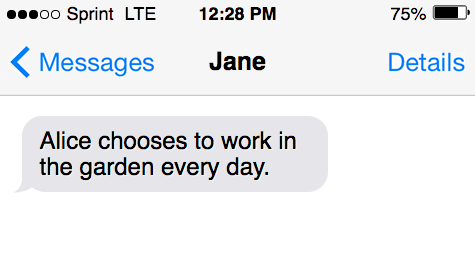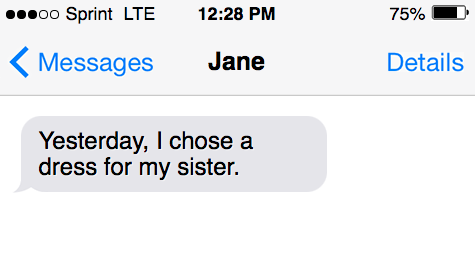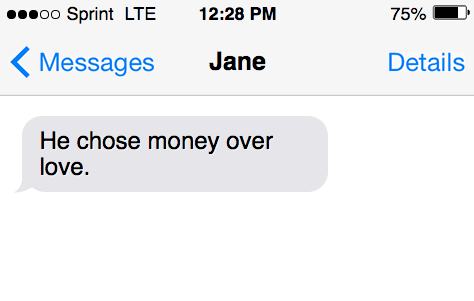It it choose or chose? Regular verbs are the norm in English. Their conjugation follows a known pattern. But certain English verbs follow different patterns. They’re referred to as irregular verbs. The irregular verb choose frequently baffles novice writers and English language learners. Although it doesn’t follow the same rules. Once you understand the rules it does follow, it becomes clear whether to use choose or chose depending on the context.
Learn the difference between choose and chose in this short grammar guide…

What does “chose” mean?
Chose is the simple past tense of choose. You use chose in a sentence when you picked up something (or someone) from multiple options in the past.
What does “choose” mean?
Choose means selecting something or someone from two or more options as being the most appropriate.
You can use choose in a sentence when deciding on a course of intended action.
Choose is the correct simple present and future tense form.
| Word | Definition |
| Choose (verb) /CHo͞oz/ | pick out or select (someone or something) as being the best or most appropriate of two or more alternatives. |
| Chose (past tense verb) | pick out or select (someone or something) as being the best or most appropriate of two or more alternatives. |
What are auxiliary verbs?
An auxiliary verb is used with a primary verb to communicate the primary verb’s voice, mood, or tense. Primary auxiliary verbs include to do, to have, and to be.
According to the Macmillan Dictionary, auxiliary verbs are the verbs ‘do’, ‘be’, and ‘have’. You use them with another verb to construct questions, tenses, passive tenses, and questions.

Am, are, do, and has been are all auxiliaries in the following sentences:
The Cambridge Dictionary defines an auxiliary verb as a verb that is usable with another verb to generate tenses, questions, and negatives. They serve as supporting verbs to change the voice, tense, and a phrase’s mood.
There are only a few auxiliary verbs can use to alter the tense of an action that the subject (noun or pronoun) is doing. You can indicate different tenses by using any form of the verb ending in “to be,” any form of “had,” and any form of “will.”

“To be” as a form
When using the forms of “to be,” remember to utilize the gerund (verb+ing) form of the primary verb since they denote continuous activity. Make sure to combine the various forms of “have” with the major verbs’ past participle forms.
Remember to use the gerund (verb+ing) form of the main verb in that specific sentence when the auxiliary verbs “have” and “been” are combined to denote the perfect continuous tense.
Use the root verb of the sentence combined with “will” to indicate the simple future tense and a gerund (verb+ing) coupled with “will be” to show the future continuous tense.
“Will” and “have”
When the main verb is used to denote the future perfect tense combined with the auxiliary verbs “will” and “have,” consider using the past participle form.
A sentence’s mood is expressed using the verb forms of the auxiliary verb “do.”
A lot of imperative and interrogative phrases employ this.
There is another auxiliary verb known as a modal auxiliary verb. You can use them as supporting verbs together with other main verbs to concentrate on the potential, capacity, necessity or likelihood of an activity taking place.
Can, could, may, might, must, will, would, shall, should, and ought are modal auxiliary verbs.
Here are some sentence examples:
- Can you do it?
- He could find time to finish the assignment by tomorrow.
- He may have liked your makeup.
- Alice might be able to help you with your English homework.
- Mom will cook for me.
- Would you like to have some cookies?
- I shall be obliged to him for his help.
- You should keep yourself active.
- You must complete the syllabus before your exam.
- We all ought to abide by the rules of the company we are a part of.
The difference between “chose” and “choose”
If you have previously made a decision, use choose.
If you are currently making a choice, use choose.
The tense forms of choose and chose are different from one another.
While chose is in the simple past tense, choose is in the present tense.
The verb in question implies to choose, pick out, or make a decision.
When to use “choose”
Choose is the present tense form. For the simple future tense form, you can also include the auxiliary verb “shall” or “will” before the word “chose.”
For example, “I will choose something in the future.”
The term chooses is also present tense which you use after singular third person subjects.
Sentence examples
Here are the sentence examples with choose:
- Alice chooses to work in the garden every day.
- My mother gave me a choice between fish and chicken, and I will choose fish tomorrow.
- She always chooses white chocolate over brown.
When to use “chose”
The past tense of choose is chose. When you choose anything from a list of options, it signifies that you have already made your decision. Or perhaps you’ve already decided what to do.
Sentence examples
Here are the sentence examples with chose:
- Yesterday, I chose a dress for my sister.
- My dad chose to skip breakfast this morning because she was not feeling well.
- He chose money over love.
When to Use “Chosen”
The past tense of choose is chosen. An auxiliary verb like has, have, or had that comes before chosen. This happens to create verb phrases or compound verbs in the present or past perfect tense.
The present perfect forms of choose are have chosen or has chosen.
Sentence examples
Here are the sentence examples with chosen:
- My son thinks he has chosen this color before.
- I have always chosen him.
- I had chosen to enroll in Calcutta University when I received Stanford University’s acceptance letter.
- My sister had chosen to leave for Germany before I asked her to stay.
When to Use “Choosing”
You can use choosing to describe a “still-in-progress” action. That indicates that you haven’t made up your mind yet. There are three progressive verb tenses, including present progressive, past progressive, and future progressive.
Sentence examples
Here are the sentence examples with choosing:
- Present progressive: I am still choosing who to call this Sunday.
- Past progressive: The sisters were choosing their outfits when their mother cancelled the trip.
- Future progressive: He will be choosing his project partner once the collaboration is over.
How to remember which form to use
The following tips will help you remember chose vs. choose:
- Chose and choose are different tenses of the same verb to choose.
- Chose is the simple past tense form.
- Choose the simple present and future forms.
- Use chose when referring to a previous choice that you already made.
- If you are currently making the decision or will make it in the future, use choose.
- Choose, and soon both share a double O. It should be simple to remember to save choose for these situations
Inside this article
Fact checked:
Content is rigorously reviewed by a team of qualified and experienced fact checkers. Fact checkers review articles for factual accuracy, relevance, and timeliness. Learn more.
Core lessons
Glossary
- Abstract Noun
- Accusative Case
- Anecdote
- Antonym
- Active Sentence
- Adverb
- Adjective
- Allegory
- Alliteration
- Adjective Clause
- Adjective Phrase
- Ampersand
- Anastrophe
- Adverbial Clause
- Appositive Phrase
- Clause
- Compound Adjective
- Complex Sentence
- Compound Words
- Compound Predicate
- Common Noun
- Comparative Adjective
- Comparative and Superlative
- Compound Noun
- Compound Subject
- Compound Sentence
- Copular Verb
- Collective Noun
- Colloquialism
- Conciseness
- Consonance
- Conditional
- Concrete Noun
- Conjunction
- Conjugation
- Conditional Sentence
- Comma Splice
- Correlative Conjunction
- Coordinating Conjunction
- Coordinate Adjective
- Cumulative Adjective
- Dative Case
- Determiner
- Declarative Sentence
- Declarative Statement
- Direct Object Pronoun
- Direct Object
- Diction
- Diphthong
- Dangling Modifier
- Demonstrative Pronoun
- Demonstrative Adjective
- Direct Characterization
- Definite Article
- Doublespeak
- False Dilemma Fallacy
- Future Perfect Progressive
- Future Simple
- Future Perfect Continuous
- Future Perfect
- First Conditional
- Irregular Adjective
- Irregular Verb
- Imperative Sentence
- Indefinite Article
- Intransitive Verb
- Introductory Phrase
- Indefinite Pronoun
- Indirect Characterization
- Interrogative Sentence
- Intensive Pronoun
- Inanimate Object
- Indefinite Tense
- Infinitive Phrase
- Interjection
- Intensifier
- Infinitive
- Indicative Mood
- Participle
- Parallelism
- Prepositional Phrase
- Past Simple Tense
- Past Continuous Tense
- Past Perfect Tense
- Past Progressive Tense
- Present Simple Tense
- Present Perfect Tense
- Personal Pronoun
- Personification
- Persuasive Writing
- Parallel Structure
- Phrasal Verb
- Predicate Adjective
- Predicate Nominative
- Phonetic Language
- Plural Noun
- Punctuation
- Punctuation Marks
- Preposition
- Preposition of Place
- Parts of Speech
- Possessive Adjective
- Possessive Determiner
- Possessive Case
- Possessive Noun
- Proper Adjective
- Proper Noun
- Present Participle
- Prefix
- Predicate



